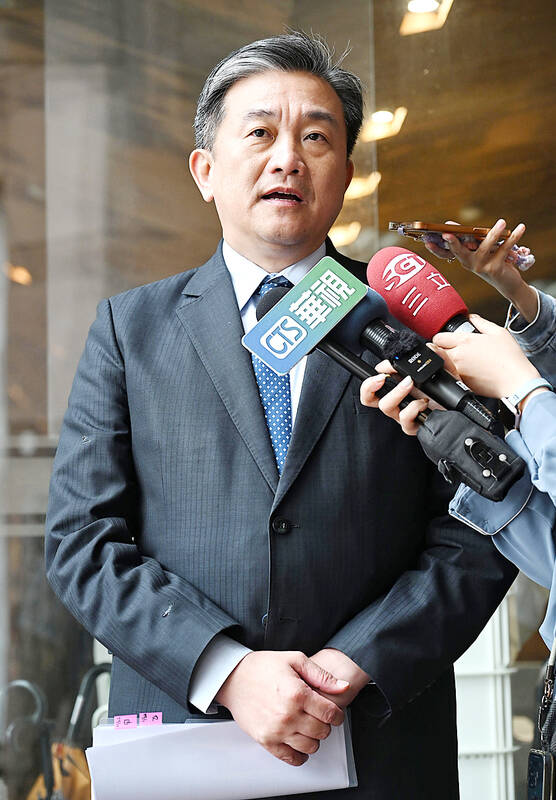Laws should be amended to counter Beijing’s psychological warfare against the armed forces, Democratic Progressive Party (DPP) Legislator Wang Ting-yu (王定宇) said on Sunday.
China has been enticing active and retired military personnel to help develop espionage organizations or to engage in psychological operations, such as by filming themselves “voluntarily” surrendering to China or signing a promise of their future surrender, he said.
Former army colonel Hsiang Te-en (向德恩) was recruited by retired lieutenant Shao Wei-chiang (邵維強) in October 2019 to work as a Chinese spy, receiving NT$40,000 (US$1,252) a month, which totaled NT$560,000 over 14 months. In January 2020, Hsiang signed a “pledge of surrender.”

Photo: Chang Chia-ming, Taipei Times
The Supreme Court sentenced Shao to 12 and a half years in prison and handed Hsiang a jail term of seven and a half years for corruption and bribery offences. The Disciplinary Court also removed Hsiang from office.
Hsiang said the sentence was unconstitutional and requested a constitutional interpretation, but his request was rejected.
The armed forces are tasked with defending national security, but Hsiang had contravened his legal duty by signing a pledge of surrender, promising to not only support cross-strait unification, but to also serve the Chinese government in case of a cross-strait war, the Constitutional Court said, citing the Supreme Court’s ruling.
The Constitutional Court said it decided not to review the case.
The Constitutional Court said that Hsiang’s argument, that signing the pledge was simply his personal opinion on cross-strait issues and that he had a right to freedom of expression, was not convincing.
In a separate case, eight current and retired military officers have been allegedly leaking classified military information to China since 2021.
Junior officers Lu Chun-fang (陸駿方) and Wu Chih-peng (吳志鵬) allegedly filmed themselves saying they would surrender to the Chinese People’s Liberation Army, while then-lieutenant colonel Hsieh Meng-shu (謝孟書) allegedly agreed to fly a Chinook helicopter to defect to China. The suspects also included retired army officer Chen Yu-hsin (陳裕炘), who has fled and is wanted.
They had jeopardized national security, the Supreme Court said, giving them prison terms ranging from one and a half years to 13 years for divulging military secrets, and contravening the National Security Act (國家安全法) and Anti-Corruption Act (貪污治罪條例).
The verdict can be appealed.
Commenting on the cases, Wang, who is also Foreign and National Defense Committee convener, said that Beijing intended to undermine the armed forces’ morale and Taiwanese’s trust in the military by making military personnel film themselves making remarks such as surrendering to China or promising to refrain from resistance in a time of war.
Such tactics are part of Chinese psychological operations targeting the armed forces to sap their morale, while those performed through Taiwanese celebrities are aimed at the public, DPP Legislator Puma Shen (沈伯洋) said.
It is difficult to curb the latter through regulations due to Taiwan’s respect for freedom of speech, he said, adding that boundaries can still be drawn.
For example, the government could refuse granting funding to artists and celebrities who have made pro-China statements, Shen added.

An essay competition jointly organized by a local writing society and a publisher affiliated with the Chinese Communist Party (CCP) might have contravened the Act Governing Relations Between the People of the Taiwan Area and the Mainland Area (臺灣地區與大陸地區人民關係條例), the Mainland Affairs Council (MAC) said on Thursday. “In this case, the partner organization is clearly an agency under the CCP’s Fujian Provincial Committee,” MAC Deputy Minister and spokesperson Liang Wen-chieh (梁文傑) said at a news briefing in Taipei. “It also involves bringing Taiwanese students to China with all-expenses-paid arrangements to attend award ceremonies and camps,” Liang said. Those two “characteristics” are typically sufficient

A magnitude 5.9 earthquake that struck about 33km off the coast of Hualien City was the "main shock" in a series of quakes in the area, with aftershocks expected over the next three days, the Central Weather Administration (CWA) said yesterday. Prior to the magnitude 5.9 quake shaking most of Taiwan at 6:53pm yesterday, six other earthquakes stronger than a magnitude of 4, starting with a magnitude 5.5 quake at 6:09pm, occurred in the area. CWA Seismological Center Director Wu Chien-fu (吳健富) confirmed that the quakes were all part of the same series and that the magnitude 5.5 temblor was

The brilliant blue waters, thick foliage and bucolic atmosphere on this seemingly idyllic archipelago deep in the Pacific Ocean belie the key role it now plays in a titanic geopolitical struggle. Palau is again on the front line as China, and the US and its allies prepare their forces in an intensifying contest for control over the Asia-Pacific region. The democratic nation of just 17,000 people hosts US-controlled airstrips and soon-to-be-completed radar installations that the US military describes as “critical” to monitoring vast swathes of water and airspace. It is also a key piece of the second island chain, a string of

The Central Weather Administration has issued a heat alert for southeastern Taiwan, warning of temperatures as high as 36°C today, while alerting some coastal areas of strong winds later in the day. Kaohsiung’s Neimen District (內門) and Pingtung County’s Neipu Township (內埔) are under an orange heat alert, which warns of temperatures as high as 36°C for three consecutive days, the CWA said, citing southwest winds. The heat would also extend to Tainan’s Nansi (楠西) and Yujing (玉井) districts, as well as Pingtung’s Gaoshu (高樹), Yanpu (鹽埔) and Majia (瑪家) townships, it said, forecasting highs of up to 36°C in those areas